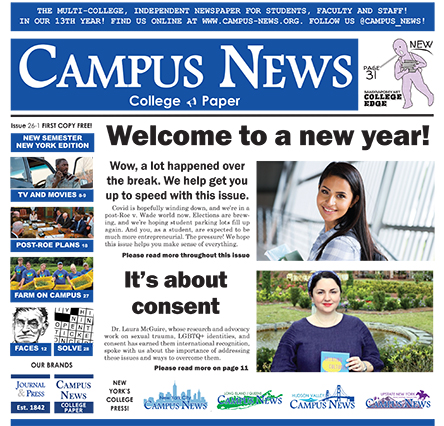Darren Johnson
Campus News
It’s no secret that community newspapers are struggling and have to do more with less.
Besides this newspaper, I also run a smalltown community newspaper upstate, The Journal & Press. I also teach Journalism courses for a local college.
At the smalltown paper, we constantly have to rethink what we can and can’t do anymore.
Someone recently suggested The Journal & Press bring back our calendar page, for example; however, calendar pages are quite labor intensive to make. Calendar items are constantly coming in, most are inconsistently written and need to be summarized neatly. It would take a single dedicated employee at least a couple of hours a day to maintain one.
And then we have to consider the Internet. Is creating a printed calendar really the best use of our time if people can just Google “events near me” instead?
Not to mention the “free” papers that service the same region as The Journal & Press. They are much better funded than a community paper, and they don’t have much of an online audience. Let them worry about a printed calendar.

The same can be said for obituaries. These used to be written by the newspapers themselves; now they are written by the families with help from funeral homes. Newspapers no longer need dedicated employees to write them. These journalists can go on to cover other things.
Which brings us to regional and statewide political candidates.
The typical playbook of a candidate who wants to win a congressional seat or statewide race is to hire an outside consultant.
There are two types of consultants:
The ones closely aligned with a political party. These are given to the candidates party officials really want to win. And there are independent consultants, who may jump from one longshot race to the next.
We get the feeling that there’s a mix of vanity on the part of the candidate and slick consultants who tell them what they want to hear.
And then reality strikes.
For the NY-21 Democratic primary, one candidate spent what seems to be hundreds of thousands of dollars running a single ad all over regional TV. (It featured a picture of Donald Trump’s buttocks and suggested the incumbent Republican rep kisses it.)
The result? About 4500 votes, less than 19 percent of the total – in a district that stretches from Troy to Potsdam. Democratic turnout overall was in the single digits.
Of course, the consultant moves on to the next chump. They get a percent of the TV buy called an “agency fee,” so they suggest to naive candidates blinded by some “Mr. Smith Goes to Washington” optimism to buy a lot of TV. “That ad with Trump’s butt is great!” the consultant may offer.
We saw the same results earlier this summer, as gubernatorial candidates who spent a ton on TV ads also did extremely poor.
Meanwhile, legitimate printed papers get endless press releases from these campaigns – but no ad dollars.
Without ad dollars, these papers will continue to wither. A large number of papers have gone out of business in recent years, leaving behind news deserts. Shouldn’t candidates, who often have huge war chests, offer, say, 1% of their advertising buy to the media outlets that actually inform their hoped-for constituents?
(And, I’d argue, dollar per dollar, community newspaper ads are more influential and authoritative than TV buys, anyway.)
We don’t use the vast majority of political press releases candidates send us – they are mostly nonsense. But a way for slick consultants to increase their billable hours.
Still, we cover the races as an obligation.
We interview all of the candidates who are running for office in our region.
The consultant who greenlit the Trump butt ads called us to complain after her candidate’s interview with us that the reporter veered a good deal from expected questioning.
She was told she could buy an ad if she had something else she wanted to say.
Of course that campaign didn’t buy a print newspaper ad. We don’t kick back agency fees, so there’s no motive for a consultant who knows their candidate has little chance.
But they got the free publicity of a full-page article.
The next thing community newspapers may want to consider abandoning are the seemingly obligatory coverage of candidates who are not from the community and really don’t care enough about it to support the local press.
We could re-assign the reporters to more impactful, truly local stories.
Perhaps you, as a voter, should not support candidates who don’t buy newspaper print ads. The message sent by not advertising in truly local media may suggest the candidate has no chance, or they really don’t want to get to know local voters. Or they are too trusting of their handlers’ sneaky advice.
Sure, print newspapers aren’t everyone’s idea of “modern,” but they certainly are one of the last bastions for our most fervent and loyal voters to gather objective information.
Darren Johnson runs Campus News, a New York Metro college paper, and The Journal & Press, a community paper in Upstate New York. He also teaches Journalism courses at whatever college will have him any given semester. Reach him at editor@cccnews.info.





Facebook Comments